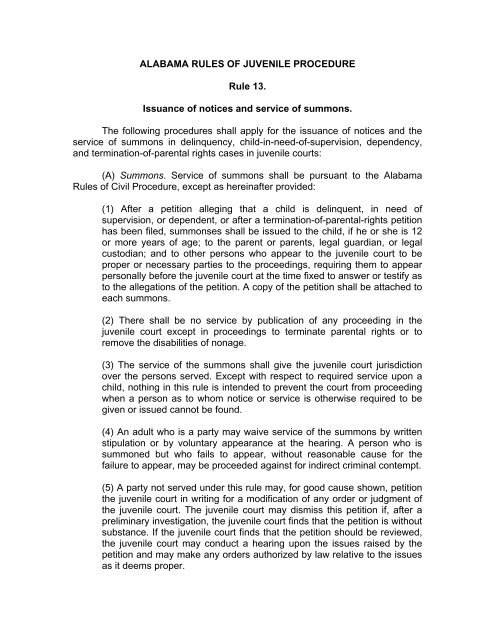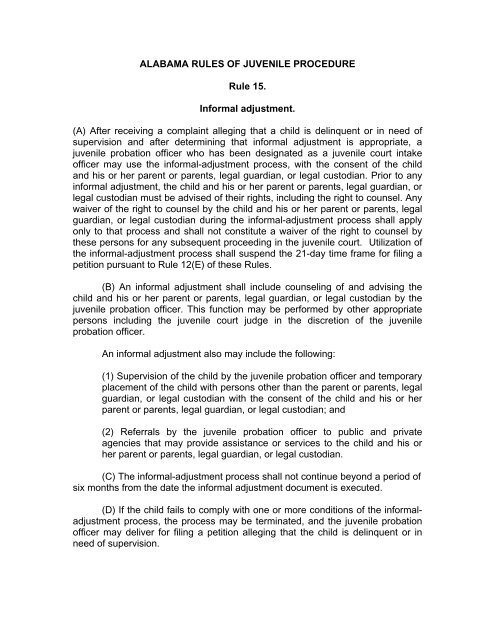Alabama Juvenile Law Explained
Alabama juvenile law focuses on individuals under 18 who are accused of crimes or offenses. Unlike adult offenders, the juvenile justice system aims to rehabilitate rather than punish. It recognizes that young people are still developing and can change their behaviors with the right guidance and support. This system operates under different rules and procedures, ensuring that the unique needs of youth are addressed while still holding them accountable for their actions.
The Structure of the Juvenile Justice System in Alabama

The Alabama juvenile justice system is set up to manage cases involving minors in a more nurturing atmosphere. A quick summary of its arrangement is as follows:
- Juvenile Courts: These specialized courts deal exclusively with cases involving minors, ensuring that proceedings are tailored to their needs.
- Probation Services: Probation officers work with juveniles to help them comply with court orders and assist in their rehabilitation.
- Detention Centers: These facilities are designed to hold juveniles awaiting court hearings or serving short-term sentences, focusing on rehabilitation.
- Community Programs: Many counties in Alabama offer programs aimed at preventing juvenile delinquency through mentorship, counseling, and education.
With an independent structure, the juvenile system focuses on rehabilitation instead of punishment, hoping to steer young people towards a more constructive way of life.
Key Principles of Alabama Juvenile Law

The juvenile law of Alabama hinges on a few basic subjects that emphasize rehabilitation and assistance. Here are some of these principles:
- Best Interest of the Child: The primary goal is to act in the best interest of the minor, focusing on their welfare and development.
- Rehabilitation: Unlike the adult justice system, Alabama emphasizes rehabilitating young offenders to prevent future criminal behavior.
- Accountability: While the system aims to rehabilitate, it also holds juveniles accountable for their actions, teaching them the consequences of their behavior.
- Family Involvement: The law encourages the involvement of families in the rehabilitation process, recognizing that support from parents and guardians is crucial.
- Confidentiality: Juvenile records are generally kept confidential to protect the minor’s future opportunities and reputation.
These rules direct how juvenile justice systems in Alabama were developed to provide a nurturing environment and promote positive transformations.
Types of Offenses Under Juvenile Law in Alabama
There are many crimes that juveniles can be charged with in Alabama similar to those that adults commit, except that the way they are treated is altogether different. Grasping the nature of these offenses might assist parents or guardians when it comes to understanding the juvenile justice system which is quite complicated. Offenses can generally fall under two major categories i.e. status or criminal offenses.
- Status Offenses: These are actions that are considered illegal only because of the age of the offender. Common examples include:
- Truancy (skipping school)
- Curfew violations
- Underage drinking
- Criminal Offenses: These are serious offenses that apply to all individuals, regardless of age. Examples include:
- Theft or burglary
- Assault
- Drug-related offenses
- Vandalism
There will be consideration of the specific details of the crime committed, the history of the minor and the age during the court process when a juvenile is charged. The aim is still to guide and rehabilitate instead of punishing harshly.
The Role of Parents in the Juvenile Justice Process
In Alabama, the role being played by parents within juvenile justice system is very important. Involving parents in this process is imperative because they are able to support their child as well as help them to understand the legal process. Some of the vital aspects of parental involvement include:
- Support System: Parents are often the first line of support for their child, providing emotional and psychological help during a challenging time.
- Communication with Legal Counsel: Parents should work closely with their child’s attorney to ensure they understand the situation and options available.
- Participation in Hearings: Parents are encouraged to attend court hearings and meetings to advocate for their child and demonstrate commitment to their rehabilitation.
- Engagement in Rehabilitation Programs: Many rehabilitation programs require parental involvement, helping to strengthen family bonds and encourage positive behavior changes.
In conclusion, parental participation may have substantial effects on a juvenile’s case outcome, emphasizing the need for family support in this process.
Consequences and Penalties for Juvenile Offenders
In Alabama consequences for juvenile offenders are aimed at rehabilitation rather than punishment. The main aim of juvenile justice system is to assist young people in making appropriate decisions. Depending upon the nature of the crime committed and its contextual factors, its aftermath can greatly differ. Here are a few examples of possible consequences:
- Informal Adjustment: Minor offenses may lead to informal adjustments, where the juvenile agrees to certain conditions (like counseling) without formal court proceedings.
- Probation: Juveniles may be placed on probation, allowing them to remain in the community under supervision while complying with specific conditions.
- Detention: In more serious cases, juveniles might be detained in a juvenile facility for a period of time.
- Community Service: Offenders might be required to complete community service as a way to give back and learn responsibility.
- Rehabilitation Programs: Many juveniles are directed into programs aimed at addressing behavioral issues, substance abuse, or educational needs.
In Alabama’s juvenile justice system, the focus is on rehabilitation so that the young lawbreakers can lead a good life and refrain from delinquency in future.
Rehabilitation Programs Available for Juveniles
In Alabama, rehabilitation programs hold a significant place in the juvenile justice system. Intended for the youth offenders to gain insight from their wrongdoings, these plans enable them to develop skills that are important for coping and move back into normal life like any other responsible citizen. Different forms of rehabilitation programs exist and they are tailored to meet the special needs of juveniles.
- Counseling and Therapy: Many juveniles benefit from individual or group counseling sessions that address underlying emotional or behavioral issues. These programs can help with anger management, substance abuse, and mental health concerns.
- Education and Vocational Training: Programs that provide educational support or vocational training are essential for helping juveniles develop skills necessary for future employment. This can include GED preparation or hands-on vocational training.
- Community Service: Engaging in community service allows juveniles to give back to their community while learning responsibility and the impact of their actions.
- Restorative Justice Programs: These programs focus on repairing harm done to victims and the community, allowing juveniles to understand the consequences of their actions while promoting healing.
- Substance Abuse Programs: For those struggling with addiction, specialized programs provide the support needed to overcome substance abuse issues, teaching coping mechanisms and healthier lifestyle choices.
This kind of education being offered in Alabama seeks to equip young offenders with skills that can help them change for better and less likely fall back into crime.
Frequently Asked Questions About Alabama Juvenile Law
Since you have young ones or those you are aware of, a number of individuals generally inquire about juvenile laws in Alabama. Below are some of these queries and their responses:
- What age is considered a juvenile in Alabama?
- In Alabama, a juvenile is typically defined as anyone under the age of 18.
- Can juveniles be tried as adults?
- Yes, in certain serious cases, juveniles can be transferred to adult court. This typically happens for severe offenses such as violent crimes.
- Are juvenile records sealed?
- Yes, juvenile records are generally kept confidential, and they can be sealed under certain conditions, which helps protect the minor’s future.
- What happens at a juvenile court hearing?
- The process usually includes an arraignment, a hearing where evidence is presented, and potentially a disposition hearing where the judge decides on the appropriate consequences.
- How can parents help their child during this process?
- Parents can support their child by staying involved, communicating with legal counsel, and engaging in available rehabilitation programs.
By expanding your comprehension of those elements of Alabama juvenile legislation, families will be better equipped to maneuver through the system’s intricacies.
Conclusion on Alabama Juvenile Law
In essence, the Alabama juvenile law is all about steering young ones to better days ahead. Instead of a punishment approach, this system takes into account the underlying reasons as to why delinquency exists and ensures young offenders bear responsibility for their deeds too. Through numerous learning, therapy and community service programs, Alabama creates a conducive atmosphere that acknowledges an individual’s ability to reform.
While traversing through this intricate system, families should comprehend parental roles, types of offenses and resources at their disposal in order to assist their child effectively. Emphasizing rehabilitation and community involvement is one way through which Alabama aims to promote the reduction of recidivism and creation of a better tomorrow for its youths.
